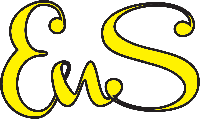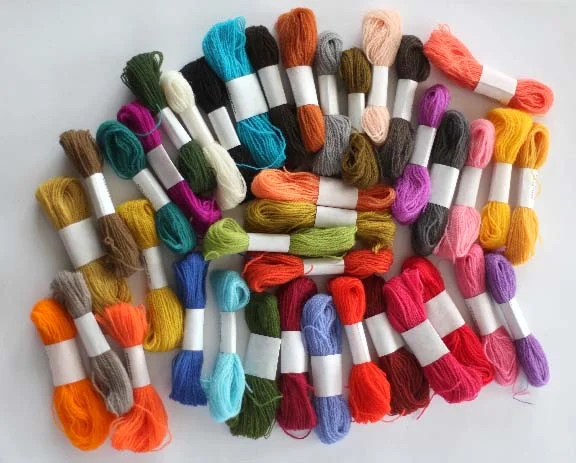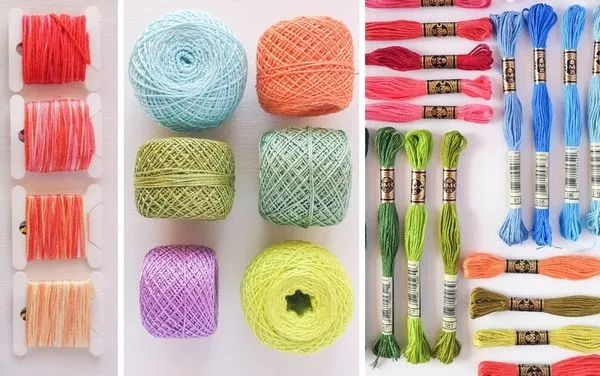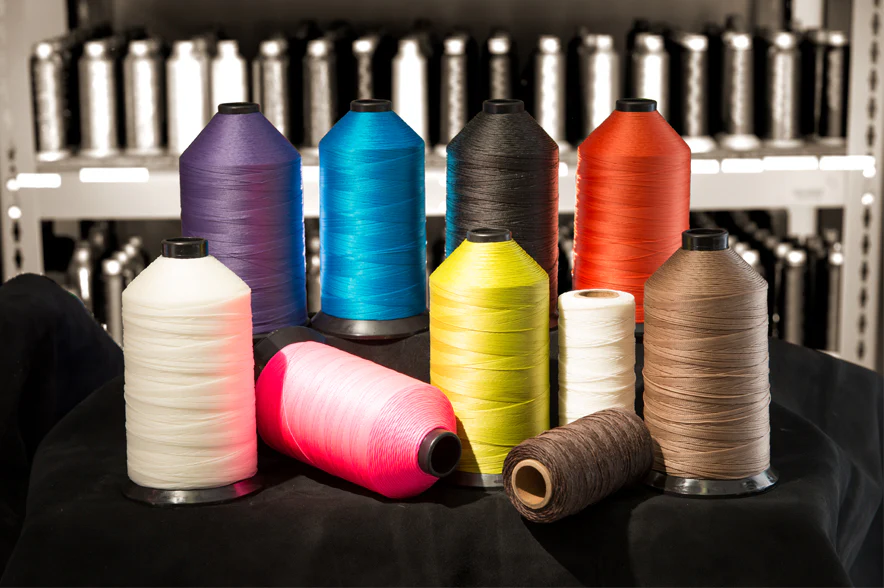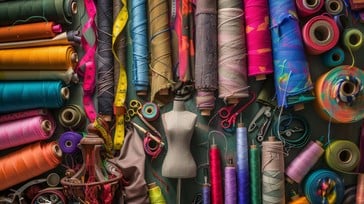
Introduction
http://IntroductionEmbroidery, an age-old art form, has found new life in today's crafting and fashion scenes. From hand-stitched heirlooms to high-quality embroidery machine designs, this versatile craft allows for a wide range of creative expression. The thread you choose plays a pivotal role in the success and durability of your projects. Each type of thread has its unique characteristics, making it suitable for different techniques and fabrics. Understanding the nuances of these threads can help you achieve the best results, whether you’re embroidering a delicate handkerchief or a bold, intricate machine design.
In this post, we'll explore the various types of threads available for embroidery, their specific uses, and which ones are best suited for machine embroidery. We'll delve into the qualities of cotton, silk, polyester, rayon, metallic, and wool threads, providing insights into their strengths and weaknesses. Additionally, we'll highlight the top choices for machine embroidery, ensuring your designs are vibrant, durable, and professional-looking.
Choosing the right thread can make all the difference in your embroidery projects. It can mean the difference between a piece that fades and frays over time and one that remains beautiful and intact for years to come. We'll also discuss common pitfalls to avoid, ensuring you steer clear of threads that might compromise the quality of your work.
Embark on this journey with us to enhance your embroidery skills and create stunning, high-quality designs that stand the test of time.
All types of Embroidery Thread
Cotton Threads
Cotton threads are a staple in the world of embroidery, known for their softness and natural appeal. They are made from 100% cotton fibers, making them an excellent choice for various hand embroidery techniques such as cross-stitch, needlepoint, and quilting. The smooth, matte finish of cotton thread provides a traditional look that is perfect for vintage and heirloom projects.
Uses: Cotton threads are ideal for hand embroidery on delicate fabrics, where their gentle texture won't damage the material. They are also widely used in cross-stitch and needlepoint, providing a crisp and clean finish to your designs.
Pros: Cotton threads are easy to handle, widely available, and come in a broad spectrum of colors. They are also relatively inexpensive, making them a popular choice for beginners and seasoned embroiderers alike.
Cons: While great for hand embroidery, cotton threads may not be as durable for machine embroidery. They can break easily under the high-speed stitching of an embroidery machine, leading to frustration and potential project delays.
Silk Threads
Silk threads bring a touch of luxury to any embroidery project. Known for their smooth texture and stunning sheen, silk threads can elevate your work to a whole new level. They are made from natural silk fibers, which are incredibly strong yet delicate.
Uses: Silk threads are best suited for hand embroidery, especially on fine fabrics like silk, satin, and linen. They are perfect for creating high-end, intricate designs that require a smooth and lustrous finish.
Pros: The beauty of silk threads lies in their sheen and strength. They glide through fabric effortlessly, creating a smooth and even stitch. Silk threads are also very strong, making them ideal for delicate but durable embroidery.
Cons: The main drawback of silk threads is their cost. They are more expensive than other types of thread, which can be prohibitive for large projects. Additionally, silk threads can be challenging to handle, as they tend to tangle and knot easily.
Polyester Threads
Polyester threads are a go-to choice for both hand and machine embroidery due to their versatility and durability. Made from synthetic fibers, polyester threads are designed to withstand high-speed stitching and the wear and tear of daily use.
Uses: Polyester threads are highly versatile and can be used for a variety of embroidery techniques. They are especially popular for machine embroidery, where their strength and resilience shine.
Pros: Polyester threads are known for their durability. They are resistant to shrinking, stretching, and fading, making them ideal for items that will be washed frequently. Polyester threads also come in a wide range of colors and finishes, including matte and shiny options.
Cons: While polyester threads are durable, they can sometimes lack the natural look and feel of cotton or silk threads. They may also be more challenging to dye, leading to slight variations in color between batches.
Rayon Threads
Rayon threads are known for their vibrant colors and high sheen, making them a popular choice for decorative embroidery. Made from regenerated cellulose fibers, rayon threads offer a smooth and silky texture that adds a touch of elegance to any project.
Uses: Rayon threads are commonly used in machine embroidery and decorative stitching. Their high sheen makes them perfect for adding highlights and accents to your designs.
Pros: Rayon threads have a beautiful luster and are available in a wide range of colors. They are strong and smooth, providing a professional finish to your embroidery projects.
Cons: Rayon threads can be prone to fraying and breaking, especially when used in high-speed machine embroidery. They may also lose their sheen over time if not cared for properly.
Metallic Threads
Metallic threads are a fantastic way to add sparkle and shine to your embroidery projects. Made with a metal foil wrapped around a core thread, these threads can make your designs stand out with a touch of glamour.
Uses: Metallic threads are ideal for decorative accents and embellishments. They are often used in festive projects, such as holiday decorations and special occasion garments.
Pros: The reflective quality of metallic threads adds a unique and eye-catching element to your embroidery. They are strong and durable, able to withstand the wear and tear of machine embroidery.
Cons: Metallic threads can be challenging to work with. They tend to fray and break easily, requiring special needles and careful handling to avoid frustration.
Wool Threads
Wool threads are thick and textured, making them perfect for creating a raised effect in your embroidery. Made from natural wool fibers, these threads add a tactile element to your designs.
Uses: Wool threads are commonly used in crewel embroidery, where their thickness and texture can create a three-dimensional look. They are also suitable for embroidering on heavier fabrics like wool and canvas.
Pros: Wool threads add texture and depth to your embroidery, making your designs stand out. They are also very durable, capable of withstanding the rigors of use and washing.
Cons: Wool threads have a limited color range compared to other thread types. They are also not suitable for fine details or delicate fabrics, as their thickness can overwhelm smaller designs.
Best Threads for Embroidery
Polyester Threads
Polyester threads are often considered the best choice for machine embroidery due to their durability and versatility. These threads are designed to handle the high-speed stitching of embroidery machines without breaking or fraying.
Reasons: Polyester threads are incredibly durable, making them perfect for items that will be washed frequently. They are also colorfast, meaning they won't fade or bleed, even after multiple washes. Their resistance to chemicals and oils ensures that your designs will remain vibrant and intact over time.
Best Brands: Some of the top brands for polyester threads include Monaco – Kingfisher, Fufus, Isacord and Madeira Polyneon. These brands offer a wide range of colors and finishes, ensuring you can find the perfect thread for any project.
Rayon Threads
Rayon threads are another excellent choice for machine embroidery, thanks to their high sheen and smooth finish. These threads add a touch of elegance to your designs, making them ideal for decorative projects.
Reasons: Rayon threads provide a beautiful luster that can make your designs pop. They are also strong and smooth, allowing for precise and even stitching. While not as durable as polyester threads, rayon threads are still a reliable choice for most machine embroidery projects.
Best Brands: Popular brands for rayon threads include Sulky and Madeira Classic. These brands are known for their high-quality threads that offer consistent performance and vibrant colors.
What to Avoid
Cheap, Low-Quality Threads
One of the biggest mistakes you can make in embroidery is using cheap, low-quality threads. These threads may seem like a cost-effective choice, but they can lead to a host of problems, including breaking, fraying, and inconsistent thickness.
Issues: Low-quality threads are prone to breaking during stitching, which can be incredibly frustrating and time-consuming. They may also have poor colorfastness, leading to fading and bleeding over time. Additionally, the inconsistent thickness of cheap threads can result in uneven stitching and a subpar finish.
Using Hand Embroidery Threads for Machine Embroidery
While it may be tempting to use the same threads for both hand and machine embroidery, this can cause significant issues. Hand embroidery threads are not designed to withstand the high-speed stitching of embroidery machines and can break or fray easily.
Issues: Hand embroidery threads may not be strong enough for machine embroidery, leading to frequent thread breaks and interruptions. They can also cause excessive lint build-up in your machine, requiring more frequent cleaning and maintenance.
Ignoring Fabric Compatibility
Choosing the wrong thread for your fabric can result in poor-quality embroidery. It's essential to consider the compatibility of your thread and fabric to ensure a smooth and professional finish.
Issues: Using a thread that is too thick or too thin for your fabric can cause puckering, breaking, or uneven stitching. For example, using wool threads on a delicate silk fabric can overwhelm the design and damage the material. Conversely, using fine silk threads on heavy canvas can result in an unbalanced and weak stitch.
Conclusion
Conclusion
Selecting the right thread for your embroidery projects is crucial for achieving high-quality results. Whether you're working on a delicate handkerchief or a bold machine design, understanding the properties and uses of different threads can help you create stunning, durable embroidery. Experiment with various types of threads to find the perfect match for your projects, and always test your threads on a small piece of fabric before diving into a large project. By avoiding low-quality threads and considering fabric compatibility, you can ensure that your embroidery designs remain beautiful and intact for years to come.
Call to Action
We'd love to hear about your favorite threads and embroidery experiences! Share your thoughts in the comments below. Don't forget to subscribe to our blog for more embroidery tips, tutorials, and inspiration. Happy stitching!
